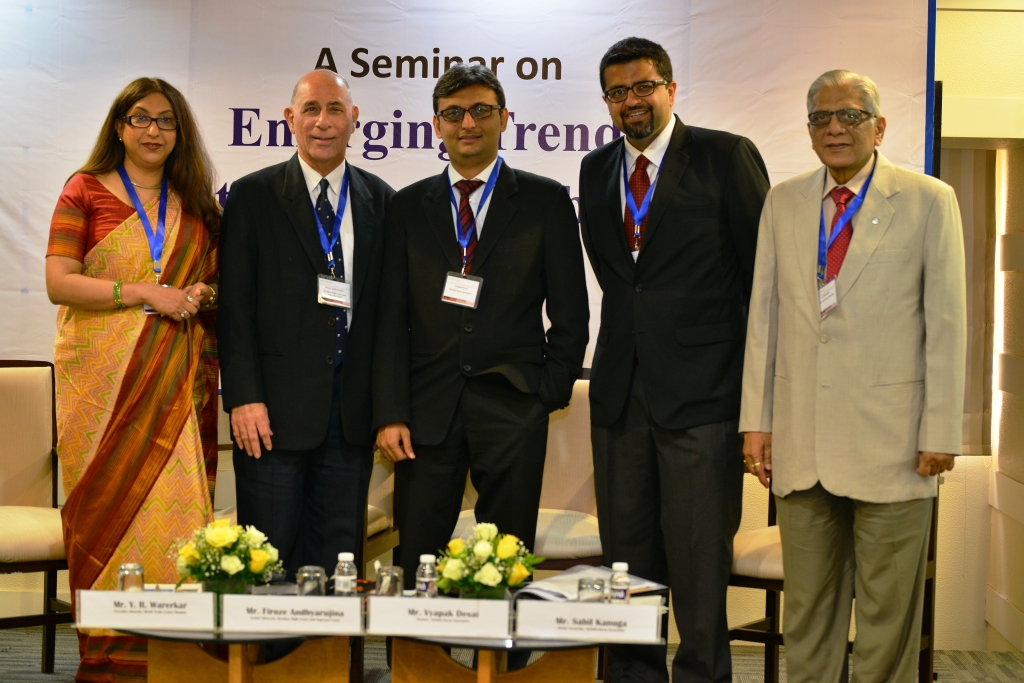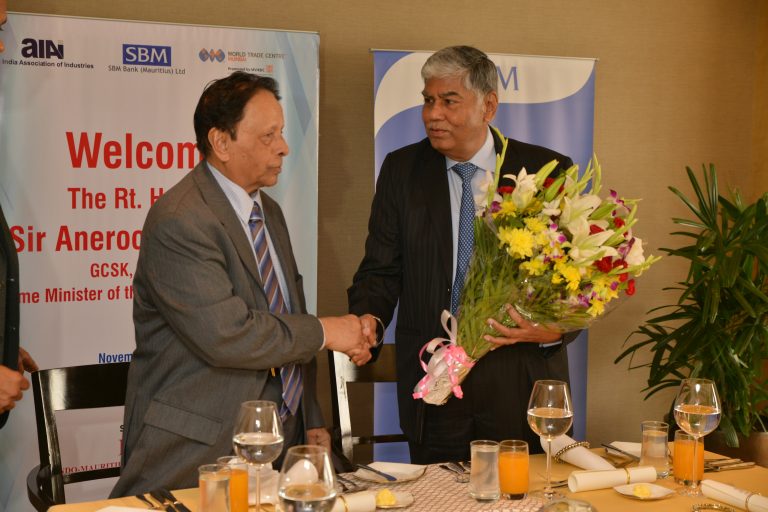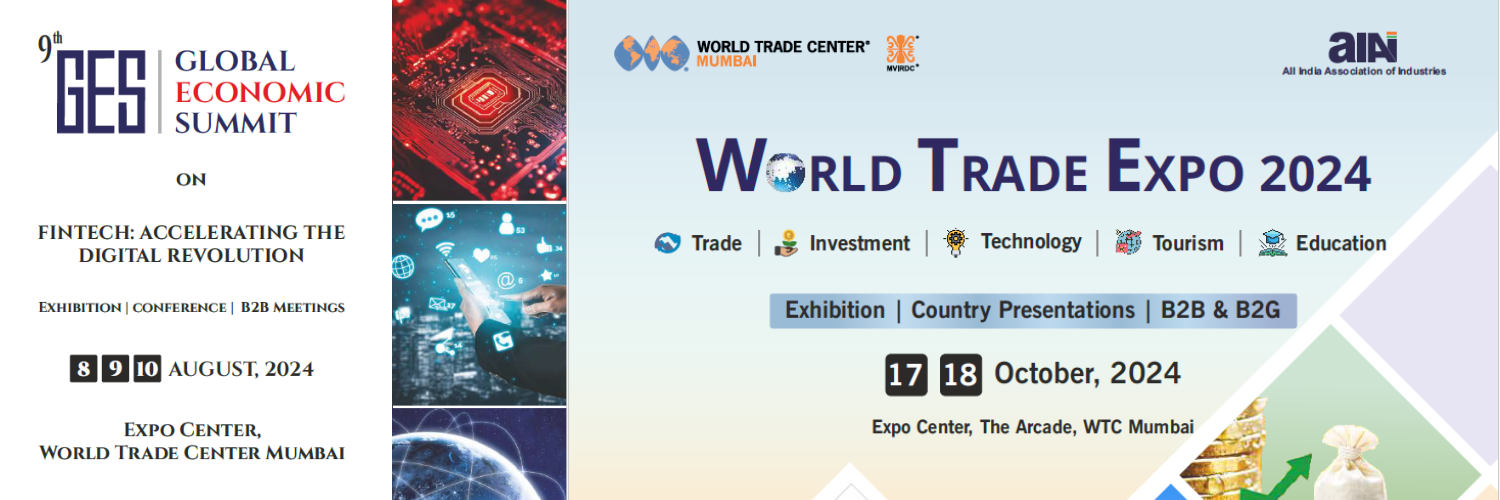- Home
- About
- Team
- About the President
- Mission
- Advisory bodies
- Associates
- Privacy Policy
- Terms and Conditions
- Pricing Policy
- Services
- Activities
- Events
- International Desk
- Sectors
- MSME
- Membership
- Publication
- Media
- Contact
Arbitration in India shifts towards international norms
Arbitration in India shifts towards international norms
“Arbitration is a useful tool and it is an appropriate time to promote it,” said Mr. Firoze Andhyarujina, the Senior Advocate with the Bombay High Court and the Supreme Court while introducing the seminar on ‘Emerging trends in international arbitration.’ The event was organized by All India Association of Industries, World Trade Centre Mumbai, Indian Arbitration Forum, Nishith Desai Associates, Hong Kong International Arbitration Centre and Ernst and Young on March 13, 2015.
Mr Andhyarujina explained that arbitration can be conducted in either of the two methods – ad-hoc method or institutional method. “The new government has emphasized the ease of doing business in India. It not only means that one gets permissions from a single window system. It also means doing away with time consuming litigations, which frustrates dispensation of justice.”
Mr Andhyarujina highlighted the importance of the report by Justice Mr. A.P. Shah which has influenced the proposed new arbitration law. “It is definitely on par with international rules and international laws of arbitration. Now the bill will focus on specialized courts dealing with commercial disputes which involve an amount of Rs 2 crore and above. These include intellectual property rights violations, international joint ventures and collaborations,”. As per the new bill, disputes between the joint partners in international arbitration will be addressed in Indian courts as per rules of international arbitration.
Mr. Vyapak Desai, Partner of Nishith Desai Associates highlighted that in 1996 India got its first unified act for domestic and international arbitrations. “Since 2012, the Indian judiciary has been recommending the litigating parties to opt for arbitration, thereby adopting a non-interventionary approach,”.
Mr. Sahil Kanuga, Senior Associate, Nishith Desai Associates highlighted that arbitration is an alternative form of dispute settlement. Arbitration allows disagreements between two parties to be decided outside the purview of courts. Speaking on the selection of arbitrators in the Indian context, Mr Kanuga mentioned that retired judges have been preferred mainly for their experience. “However, in international arbitration, there is increasing reliance on experts as against judges,” Kanuga added.
Mr Kanuga further observed that institutional arbitration has rules and experts in place, which adds certainty. “The world is moving towards institutional arbitration. Though, India has been following ad-hoc method, the international parties prefer institutional arbitration. Now, in India, the trend is changing and Indian clients prefer to settle arbitrations at Singapore, London and Hong Kong,” said Kanuga.
Both Desai and Mr. Kanuga emphasized the need for arbitration since conflict is on the rise in modern businesses. Another important factor for arbitration is the cost. “The losing party has to bear the cost of arbitration of the winning party. This would discourage frivolous arbitration,” said Mr. Kanuga.
Mr Yogen Vaidya, Partner, Fraud Investigation & Dispute Services at Ernst & Young LLP said that India ranked 72 in the parameter of ‘efficiency of legal systems’ in the Ease of Doing Business. However, now with recent Supreme Court judgments on arbitration, the perception with regard to arbitration in India is changing.” According to Mr Vaidya, the right time to claim the costs, the methodology and reasonableness standards need to be followed. Various methodologies for calculation of damages depending on specific facts and circumstances will have to be adopted and followed,” said Vaidya. He also highlighted the role of forensic accountants and specialists when claiming damages and providing evidence in an arbitration proceeding.
Mr Aditya Kurian, Counsel, Hong Kong International Arbitration Centre (HKIAC) highlighted the various benefits offered by HKIAC to the arbitrating parties. “We are increasingly seeing Indian parties approaching HKIAC for arbitration in the interest of time and cost”, Kurian said. HKIAC deals with administration of arbitration, mediation and domain name disputes in international business. He spoke about the various advantages of HKIC’s service, which ensure cost-effectiveness, time-bound award, confidentiality in the settlement of disputes.
Earlier, Mr. Y.R. Warerkar, the Executive Director, World Trade Centre, in his welcome address observed that in diverse judicial and cultural systems, different languages, economic and political climates creates significant obstacles to resolving international disputes. Arbitration provides an efficient and neutral means to resolve international disputes.
“WTC in its key object to promote international trade and investments devotes attention to assist businesses in the conduct of international trade and investment effectively.” Warerkar said. The Centre offers a cohesive platform to its members to learn new business concepts and gain understanding of the various aspects of negotiation and dispute resolution in global commerce. Businesses operating in a complex global environment need to know how to safeguard their business interests as well as the pre-emptive steps they should take vis-à-vis their business counterparts.
Ms Rupa Naik, Executive Director, All India Association of Industries proposed the vote of thanks.
Left – Right: Ms. Rupa Naik, Executive Director, All India Association of Industries and Director – Projects, World Trade Centre Mumbai, Mr. Firoze Andhyarujina, Senior Advocate, Bombay High Court and Supreme Court, Mr. Vyapak Desai, Partner, Nishith Desai Associates, Mr. Sahil Kanuga, Senior Associate, Nishith Desai Associates and Mr. Y. R. Warerkar, Executive Director, World Trade Centre Mumbai at the Seminar on Emerging Trends in International Arbitration organised by All India Association of Industries, World Trade Centre Mumbai, Nishith Desai Associates, Ernst & Young, Hong Kong International Arbitration Centre and Indian Arbitration Forum, held on March 13, 2015 at World Trade Centre Mumbai.
Left – Right: Mr. Aditya Kurian, Counsel, Hong Kong International Arbitration Centre, Mr. Yogen Vaidya,Partner, Fraud Investigation and Dispute Services, Ernst & Young, Mr. Firoze Andhyarujina, Senior Advocate, Bombay High Court and Supreme Court, Mr. Y. R. Warerkar, Executive Director, World Trade Centre Mumbai, Mr. Vyapak Desai, Partner, Nishith Desai Associates and Mr. Sahil Kanuga, Senior Associate, Nishith Desai Associates at the Seminar on Emerging Trends in International Arbitration organised by All India Association of Industries, World Trade Centre Mumbai, Nishith Desai Associates, Ernst & Young, Hong Kong International Arbitration Centre and Indian Arbitration Forum, held on March 13, 2015 at World Trade Centre Mumbai.
Recent Posts
Categories
- Agriculture
- Banking and finance
- Biotechnology
- Business Process Outsourcing
- Chemicals
- Defence
- Drugs & Pharmaceuticals
- Economic Affairs & Taxation
- Energy
- Engineering
- Exports & Imports
- Food Processing
- Food Processing
- ICTE Manufacturing
- Inbound delegation
- Information & Communication Technology
- Infrastructure
- Innovation
- Logistics
- Manufacturing
- Media & Entertainment
- Medium & Small Scale Industry
- Micro
- Oil and Gas
- Petrochemicals
- Ports
- Power
- Press Information Bureau-Government of India
- Press Release
- Press Release: Quanzhou Delegation Explores Business Collaboration in India
- Renewable Energy
- Tourism & Hospitality
- Uncategorized
- Women Empowerment
Archives
- March 2024
- January 2024
- November 2023
- October 2023
- September 2023
- August 2023
- July 2023
- June 2023
- May 2023
- April 2023
- March 2023
- February 2023
- January 2023
- February 2022
- January 2022
- December 2021
- November 2021
- October 2021
- September 2021
- August 2021
- July 2021
- June 2021
- May 2021
- April 2021
- March 2021
- February 2021
- January 2021
- December 2020
- November 2020
- September 2020
- August 2020
- June 2020
- May 2020
- April 2020
- March 2020
- February 2020
- January 2020
- November 2019
- August 2019
- July 2019
- May 2019
- April 2019
- March 2019
- July 2018
- June 2018
- April 2018
- February 2018
- January 2018
- December 2017
- November 2017
- October 2017
- September 2017
- August 2017
- July 2017
- June 2017
- May 2017
- April 2017
- March 2017
- February 2017
- January 2017
- December 2016
- November 2016
- October 2016
- September 2016
- August 2016
- July 2016
- June 2016
- May 2016
- April 2016
- March 2016
- February 2016
- January 2016
- December 2015
- November 2015
- October 2015
- September 2015
- August 2015
- July 2015
- June 2015
- May 2015
- April 2015
- March 2015
- February 2015
- January 2015
- December 2014
- November 2014
- October 2014
- September 2014
- August 2014
- July 2014
- June 2014
- May 2014
- April 2014
- March 2014
- February 2014
- January 2014



